| Medal record | ||
|---|---|---|
| Women's Fencing | ||
| Asian Games | ||
| 2006 Doha | Epée Team | |
Pau Ming Wai Akina (born 14 October 1974) is a fencer from Hong Kong, China who won a bronze medal at the 2006 Asian Games in the women's sabre team competition. [1]
| Medal record | ||
|---|---|---|
| Women's Fencing | ||
| Asian Games | ||
| 2006 Doha | Epée Team | |
Pau Ming Wai Akina (born 14 October 1974) is a fencer from Hong Kong, China who won a bronze medal at the 2006 Asian Games in the women's sabre team competition. [1]

Hong Kong is a special administrative region of China. With 7.4 million residents of various nationalities in a 1,104-square-kilometre (426 sq mi) territory, Hong Kong is the fourth most densely populated region in the world.

The special administrative regions (SAR) of the People's Republic of China are one of four types of province-level divisions of the People's Republic of China directly under the control of its Central People's Government, being integral areas of the country. As a region, they possess the highest degree of autonomy from China's central government. However, despite the relative autonomy that the Central People's Government offers the special administrative regions, the National People's Congress and its Standing Committee remains capable of enforcing laws for the special administrative regions.
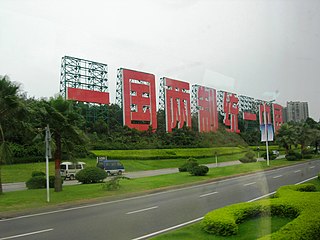
"One country, two systems" is a constitutional principle of the People's Republic of China (PRC) describing the governance of the special administrative regions of Hong Kong and Macau.

The Basic Law of the Hong Kong Special Administrative Region of the People's Republic of China is a national law of China that serves as the organic law for the Hong Kong Special Administrative Region (HKSAR). Comprising nine chapters, 160 articles and three annexes, the Basic Law was composed to implement Annex I of the 1984 Sino-British Joint Declaration.

The New Territories is one of the three areas of Hong Kong, alongside Hong Kong Island and the Kowloon Peninsula. It makes up 86.2% of Hong Kong's territory, and contains around half of the population of Hong Kong. Historically, it is the region described in the Convention for the Extension of Hong Kong Territory. According to that treaty, the territories comprise the mainland area north of Boundary Street on the Kowloon Peninsula and south of the Sham Chun River, as well as over 200 outlying islands, including Lantau Island, Lamma Island, Cheung Chau, and Peng Chau in the territory of Hong Kong.

Hong Kong International Airport is an international airport on the island of Chek Lap Kok in western Hong Kong. The airport is also referred to as Chek Lap Kok International Airport or Chek Lap Kok Airport, to distinguish it from its predecessor, the former Kai Tak Airport.
The Hong Kong dollar is the official currency of Hong Kong. It is subdivided into 100 cents. Historically, it was also subdivided into 1000 mils. The Hong Kong Monetary Authority is the monetary authority of Hong Kong and the Hong Kong dollar.
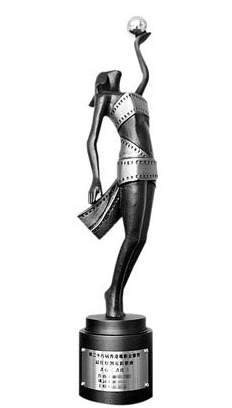
The Hong Kong Film Awards, founded in 1982, is an annual film awards ceremony in Hong Kong. The ceremonies typically take place in April, and have mostly been held at the Grand Theatre of the Hong Kong Cultural Centre since 1991. The awards recognise achievement in various aspects of filmmaking, such as directing, screenwriting, acting and cinematography. The awards are regarded as the Hong Kong equivalent of the Academy Awards.
Cantonese is the traditional prestige variety of Yue Chinese, a Sinitic language belonging to the Sino-Tibetan language family. It originated in the city of Guangzhou and its surrounding Pearl River Delta.

The region of Hong Kong has been inhabited since the Old Stone Age, later becoming part of the Chinese Empire with its loose incorporation into the Qin dynasty. Starting out as a farming fishing village and salt production site, it became an important free port and eventually a major international financial center.

The Hong Kong national football team represents Hong Kong in international football and is controlled by the Football Association of Hong Kong, China, the governing body for football in Hong Kong.
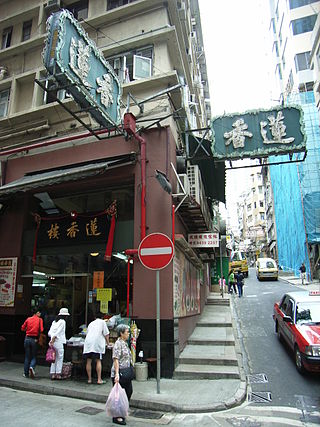
Hong Kong cuisine is mainly influenced by Cantonese cuisine, European cuisines and non-Cantonese Chinese cuisines, as well as Japanese, Korean and Southeast Asian cuisines, due to Hong Kong's past as a British colony and a long history of being an international port of commerce. Complex combinations and international gourmet expertise have given Hong Kong the labels of "Gourmet Paradise" and "World's Fair of Food".

The Imperial Japanese occupation of Hong Kong began when the governor of Hong Kong, Sir Mark Young, surrendered the British Crown colony of Hong Kong to the Empire of Japan on 25 December 1941. His surrender occurred after 18 days of fierce fighting against the Imperial Japanese Army that invaded the territory. The occupation lasted for three years and eight months until Japan surrendered at the end of the Second World War. The length of the period later became a metonym of the occupation.

The handover of Hong Kong from the United Kingdom to the People's Republic of China was at midnight on 1 July 1997. This event ended 156 years of British rule in the former colony, which began in 1841.

The Hong Kong Special Administrative Region passport is a passport issued only to permanent residents of Hong Kong who also hold Chinese citizenship. In accordance with the Basic Law of the Hong Kong Special Administrative Region, since the handover in 1997, the passport has been issued by the Immigration Department of the Government of Hong Kong under the authorisation of the Central People's Government of the People's Republic of China. As the official languages of Hong Kong are Chinese and English, the passport is printed bilingually in both Chinese and English. In addition, unlike Chinese passport which can be directly issued by Chinese diplomatic missions abroad, the Immigration Department of Hong Kong is the only issuing authority for HKSAR passports.
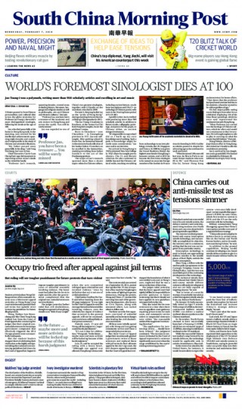
The South China Morning Post (SCMP), with its Sunday edition, the Sunday Morning Post, is a Hong Kong-based English-language newspaper owned by Alibaba Group. Founded in 1903 by Tse Tsan-tai and Alfred Cunningham, it has remained Hong Kong's newspaper of record since British colonial rule. Editor-in-chief Tammy Tam succeeded Wang Xiangwei in 2016. The SCMP prints paper editions in Hong Kong and operates an online news website that is blocked in mainland China.
Hongkongers, Hong Kongers, Hong Kongese, Hongkongese, Hong Kong citizens and Hong Kong people are demonyms that refer to a resident of Hong Kong, although they may also refer to others who were born and/or raised in the territory.
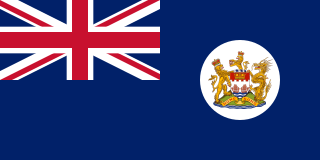
Hong Kong was a British colony and later a dependent territory of the United Kingdom from 1841 to 1997, with a period of Japanese occupation from 1941 to 1945 during World War II. The colonial period began with the British occupation of Hong Kong Island under the Convention of Chuenpi in 1841 of the Victorian era.

The 2019–2020 Hong Kong protests were a series of demonstrations against the Hong Kong government's introduction of a bill to amend the Fugitive Offenders Ordinance in regard to extradition. It was the largest series of demonstrations in the history of Hong Kong.

The Law of the People's Republic of China on Safeguarding National Security in the Hong Kong Special Administrative Region is a national law of China on Hong Kong national security passed in 2020. It is implemented in Hong Kong in accordance with Hong Kong Basic Law Article 18, which allows for China's national laws to be valid in Hong Kong if they are included in Annex III. It was formulated under the authorization of the National People's Congress decision on Hong Kong national security legislation. The law was passed on 30 June 2020 by the Standing Committee of the National People's Congress as a means of resolving the anti-extradition bill protests instigated by a Hong Kong local bill proposed in 2019 to enable extradition to other territories including the mainland, and came into force the same day.